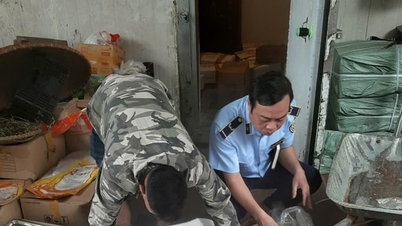(HNM) - The illegal purchase and use of electronic invoices causes loss of state budget revenue and disrupts fair competition among businesses. The Tax Department has been implementing many solutions to prevent this situation. Thereby, helping to prevent and handle violations of the law on invoices and documents in particular and on taxes in general, contributing to enhancing the effectiveness and efficiency of tax management as well as creating a healthy and equal business environment for the business community and taxpayers.
The General Department of Taxation has deployed an electronic invoice system to serve taxpayers nationwide since July 1, 2022. Accordingly, businesses, organizations and individuals will make a synchronous conversion to using electronic invoices instead of traditional paper invoices. To date, the Tax sector has received and processed over 4 billion electronic invoices. The deployment of the electronic invoice system helps save costs for issuing and storing invoices; facilitates the comparison, review and inspection of tax declarations, tax refunds, etc., contributing to improving the efficiency of tax management. However, taking advantage of the openness of mechanisms and policies, there are still some entities that establish enterprises to illegally buy, sell and use electronic invoices, or commit fraudulent acts when using electronic invoices to appropriate state budget funds.
Director of the Tax Inspection Department (General Department of Taxation) Vu Manh Cuong said that the subjects used fake identity cards, citizen identification cards, hired people to act as legal representatives... to establish a chain of intermediary enterprises, or acquired enterprises and changed legal representatives. To legalize invoices with items that required documents proving their origin (soil, sand, gravel, wood, gasoline, oil, food...), the subjects forged the seals of competent authorities to create fake documents, transferred them to enterprises to buy invoices; established or changed the business location of enterprises to sell invoices with items suitable for each locality such as raw materials, labor, machinery rental... When declaring taxes, the subjects often declared the correct figures on the established output invoices, but falsely declared the value of purchased goods and services, input value added tax to minimize the amount of tax payable on the declaration, or even did not generate any tax payable.
In fact, many cases of illegal buying, selling and using of electronic invoices have been discovered recently. At the end of 2022, Phu Tho Provincial Police issued a decision to prosecute the case and prosecute 5 subjects for illegal buying and selling of electronic invoices and forging seals and documents of agencies and organizations. In this case, two subjects residing in Ho Chi Minh City led the way through social networks to buy 228 companies with legal representatives using fake documents and addresses in many provinces and cities across the country. Then, they set up a network of intermediaries to exploit the websites of Vietnamese enterprises, searching for and selling electronic value-added invoices to many units and enterprises nationwide with exceptionally large sales, about over 25 trillion VND, tax losses of over 2.5 trillion VND; the subjects illegally profited about over 1.2 trillion VND. Previously, in September 2022, the Hanoi People's Court brought to trial the case of "Illegal trading of invoices" involving two groups with many subjects conducting the act of trading invoices with a value of up to more than 1,000 billion VND...
To prevent the above situation, the Minister of Finance recently issued Official Dispatch No. 01/CD-BTC on strengthening the management and supervision of the issuance and use of electronic invoices. The General Department of Taxation has issued Directive No. 01/CT-TCT on strengthening measures to review and inspect invoices to prevent fraud in the use of invoices. The General Department of Taxation has also requested the Ministry of Information and Communications to direct relevant units to coordinate with tax authorities to prevent, remove, and handle websites showing signs of information and advertising the purchase and sale of invoices on cyberspace.
Notably, the Tax sector has deployed the “Database analysis and electronic invoice management system”. The official operation and deployment of this system will help tax authorities focus on reviewing and analyzing to promptly detect signs of risk in the issuance of electronic invoices.
Source


































































































Comment (0)